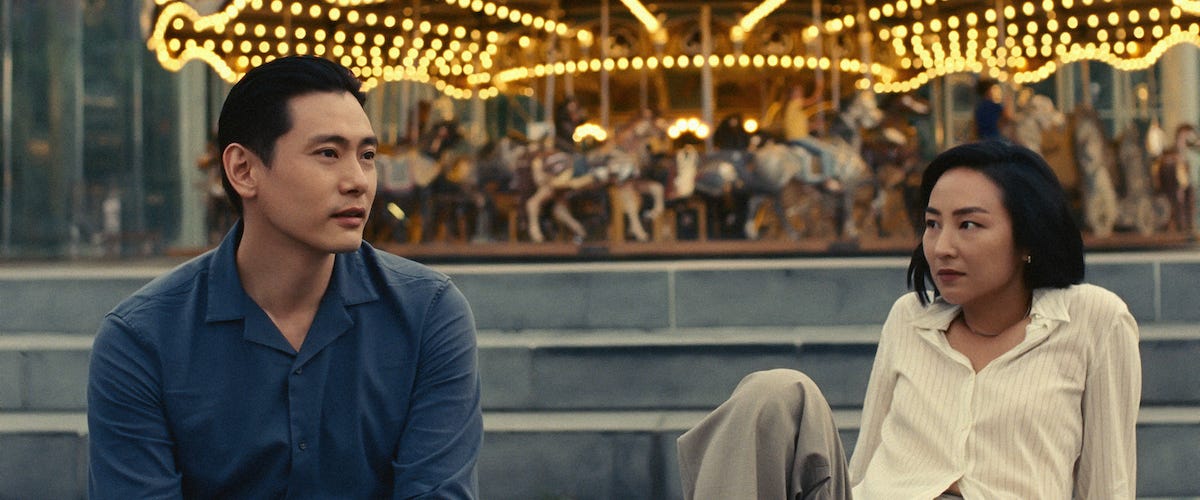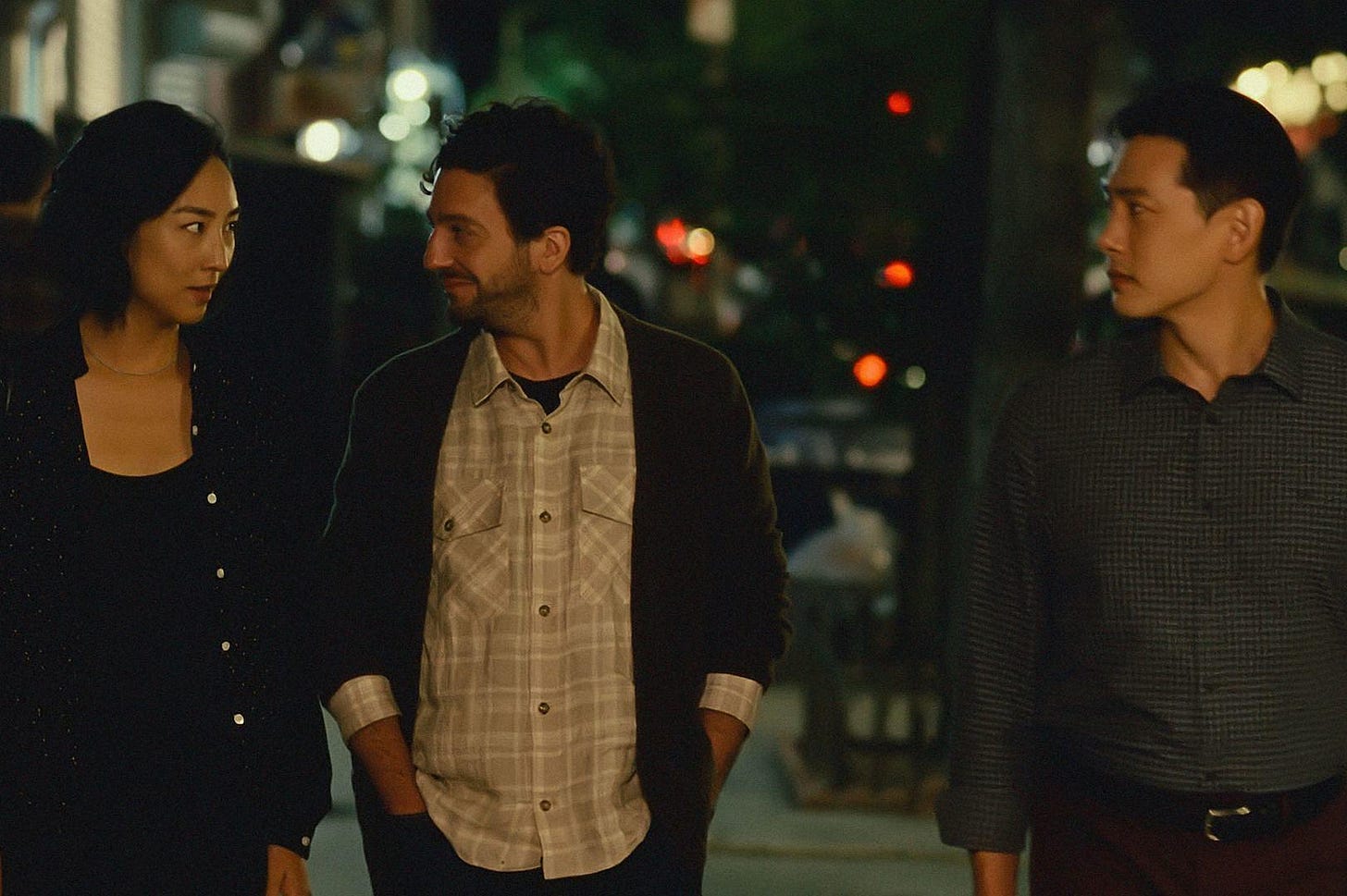Hae Sung and Nora in New York, frightened and enthralled by the wonder of reconnecting
Past Lives (2023)
Now in theaters, Limited; opens Wide June 23
Maybe everyone has had a crush on a schoolmate, even from back in elementary school. I certainly did. I can even dimly recall the face.
Do I ever wonder what happened to that object of my affection? Yes. My mind drifts back once in a blue moon.
But what if instead of fading away that person had lodged deep in my consciousness, waiting for me to reawaken the spell they cast?
Past Lives turns on that question, and exerts its own astonishing, sinuous pull. My own life and longings kept welling up as I watched.
Some 24 years ago in Seoul, South Korea, Nora (Moon Seung-ah) and Hae Sung (Leem Seung-min), on the cusp of their teens, are fascinated with each other and clueless about why.
Their youthful tie has a wordless, consuming power. When either of them does something weird, the other playfully labels the offender a “psycho” and they both laugh it off.
They’ll both remember that affectionate teasing for the rest of their lives, but they don’t know that yet.
Even at a young age, Nora is already a committed writer, and, asserting that Koreans “don’t win Nobel Prizes”, she’s thrilled with her parents’ decision to immigrate to North America.
Hae Sung, who excels at math, is more shaken than he can understand at his friend’s leave-taking. Neither of them manages a formal goodbye.
Perhaps the most daring stroke in writer-director Celine Song’s astonishing debut is how with this simple childhood opening her movie prepares us to journey forward and backward in time.
Once the young pair speak their pinched, aloof Byes, in a single shot we see Nora climb a stairway to her home while Hae Sung veers off on a different path toward his.
This striking image suggests an innocent, pre-conscious insight lingering between them, but we’re not sure they’re imagining any such thing.
We keep gazing backward at this fraught moment, even as the story zooms forward.
The young Nora and Hae Sung at parting, not knowing how their futures will entwine
Some 12 years later, Hae Sung (now played by Teo Yoo) has settled into a career as an engineer.
In New York, Nora (now played by Greta Lee) has become a happy, modestly successful writer who’s somewhat lowered her sights merely to winning a Pulitzer Prize.
One night on the Internet she stumbles across Hae Sung’s profile and, a little scared but unable to help herself, she reaches out to him.
He’s thrilled, and over four months as they obsessively video chat on Skype, their attachment revives, feeling much richer than it did in childhood.
They become so close that Nora worries her emotions are overwhelming her, and she tearfully tells Hae Sung they need to take a break. Accepting her decision, he’s both perplexed and shattered.
And I was unexpectedly caught up. It’s early in the year 2023, but when a movie comes along that by the halfway point, as happens here, overwhelms me, I set it as my marker.
For the rest of this year, I’ll be looking for another movie to stir me like this, unfold with a sense of life and fate. Not grand, but also not the least bit treacly.
This is a movie that feels as if you could have seen it all before, because it recalls the jangling, thrilling capriciousness of growing up itself.
When a movie pins me to the back of my seat like this one did, reinvigorating my sense of what movies can do, it leaps to the forefront of my mind.
Song is a gifted director who, in her first feature, can make people separated by years and an ocean feel startlingly close, as if something sacrosanct has gripped them both and won’t let go.
Twelve more years pass and Nora, well into her 30s, is a successful playwright devotedly married to her white American husband Arthur (John Magaro), also a successful writer.
They live cozily in the partly gentrified but still scruffily bohemian East Village in Manhattan.
Nora is surprised but not the least put off when she hears from Hae Sung that he’ll soon be visiting New York and would like to see her.
Amazed and fiercely curious, she writes back that she can’t wait.
Arthur unhesitatingly approves but wonders what such a distant yet powerful connection with another man, who’s Korean, could mean for his wife.
Nora, Arthur and Hae Sung in the East Village, wondering what the future could hold
A triangle emerges. As Nora shows Hae Sung the New York City sights, they both wonder at their enduring bond, an engrossing “relationship” that’s tenderly precarious.
Hae Sung has a longstanding girlfriend back in Seoul but says they’re still not sure about marrying.
The by now thoroughly Americanized Nora assures Arthur that “I’m not going to leave you for some Korean dude.”
Hae Sung, she explains, in his Asian calm, courtesy and conservatism, is “a Korean Korean”, which she no longer is.
On top of that, she’s blissfully content with her white American husband.
Arthur doesn’t seem entirely sure. What if Nora and Hae Sung share a decades-long mutual mindset?
Maybe this inner light can leap over different cultures, a solid marriage and, most mysteriously, the passage of time itself.
Nora and Hae Sung both acknowledge that they’re entranced by the Korean concept of inyeon, which means that if something isn’t fully completed in one lifetime it could be in the next life, or the one after that.
Maybe they’ve been integral to one another in a previous life and are bound to be now, as well as in a life to come. They don’t control where fate shepherds them.
Unaccountably, the movie manages to make three passages in life, from just before one’s teens to striving in one’s 20s to an accomplished life in one’s 30s, seem like a single chunk of time.
The “before” and “hereafter” of life press from either end, which is why Nora and Hae Sung’s faces can look both enthralled and deeply frightened.
Are their past and future lives demanding that they fulfill to the nth degree what seems to be happening in this one?
Nothing could make such an esoteric concept hold an audience – I was on the edge of my seat all the way through – without fine, subtle, unguarded acting.
In their every gesture Lee and Yoo bring a startled clarity, perception and wonder in the face of the unknown.
(Intriguingly, Song didn’t allow the two actors to touch one another during rehearsals. “Save it for the screen,” she commanded.
Which means their embraces that we see captured on camera were indeed their very first, and that dewy bloom of amazement fills all their scenes together.)
They seem nestled, not to be pried apart, each essential for the rounding of the other.
This is a movie that feels as if you could have seen it all before, because it recalls the jangling, thrilling capriciousness of growing up itself.
When a movie pins me to the back of my seat like this one did, reinvigorating my sense of what movies can do, it leaps to the forefront of my mind.
It becomes my Picture of the Year, and so far in 2023 Past Lives is unequivocally that.
The rest of the year may hold other surprises. But every movie opening between now and January has a high barrier to hurdle.







Picture of the year! YES!